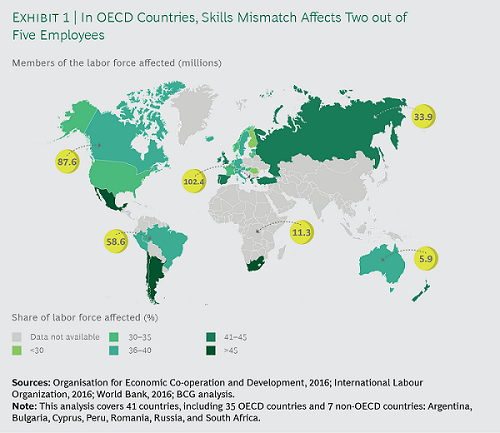Technological, environmental and economic changes are unfolding with great intensity. Whether it is blockchain innovation or a virus that is creating an economic slump. Change is inevitable and those who don’t adapt will get left behind. Therefore, one should update their skills to be able to define a new career path.
Let’s take a look at the technological landscape. Businesses are adopting technologies like edge computing and machine learning to maximise their IT capabilities. This has led to rise in never-seen-before demands. Demands in product diversification, professional expertise and innovation accelerators.
In this blog, we will look at what you can do to meet these changing demands.
 At this point, we’ll look at some current market statistics. A report shows 17.8 million workers have outdated skills in the UK. By 2030, Only 47% of Indian graduates will have the basic skills to be employable, says the UNICEF report. In the US, 120 million workers may need to be reskilled in the next three years says an IBM Study. In OECD countries, skill mismatch is affecting two out of every five employees. There is a critical need for skill development.
At this point, we’ll look at some current market statistics. A report shows 17.8 million workers have outdated skills in the UK. By 2030, Only 47% of Indian graduates will have the basic skills to be employable, says the UNICEF report. In the US, 120 million workers may need to be reskilled in the next three years says an IBM Study. In OECD countries, skill mismatch is affecting two out of every five employees. There is a critical need for skill development.
On the other hand, there is also the looming likelihood of smart technologies and automation replacing jobs. Some jobs that existed only a short time ago, such as telephone operators, manual bookkeeping, librarians and typists, have disappeared. And recently, Adobe announced that support for its (once cutting edge) Flash software will stop Dec 31, 2020. The only option for flash workers is to update skills or upskill or re-skill in new fields.
 In cases like this, when skills become obsolete, you will be forced to apply to jobs that are different from your past jobs. This will, in turn, require you to learn new skills. You may pick up a new skill but later, when you start working, realise that you do not like the new job. This may result in dissatisfaction and a decline in performance. A better approach is to learn new skills while you are working. And, not wait for uncertainties to happen.
In cases like this, when skills become obsolete, you will be forced to apply to jobs that are different from your past jobs. This will, in turn, require you to learn new skills. You may pick up a new skill but later, when you start working, realise that you do not like the new job. This may result in dissatisfaction and a decline in performance. A better approach is to learn new skills while you are working. And, not wait for uncertainties to happen.
So, what can you do?
Be Flexible
Look at the change as an opportunity to grow. You can either upskill or reskill. To upskill means to learn something new, adding more value to your existing skillset. To reskill means to learn something completely new maybe even start on a new career path.
Be Efficient
Learn soft skills, problem-solving skills, critical reasoning and leadership skills. Irrespective of the field or level you are in, honing such skills will position you for success. Being able to collaborate, brainstorm and manage time well will improve your efficiency.
Be Credible
What is credibility? Your reputation. Your credibility will improve when your talk matches the walk. Whether it is a skill or a certificate, your ability to ‘prove it’ will increase your credibility. For example, while applying for a job, a recruiter relies on your papers to gauge your credibility. You can establish your credibility in such instances by providing a digital certificate.
Why a digital certificate? Unlike a paper certificate, a digital certificate can be accessed ‘on the go’. The links in it can be verified from anywhere, on any device with an internet connection. Thereby, proving the authenticity of the data and its source.
To succeed in a job or define a career path, identifying your abilities or skills is an essential step.
To begin with, list your skills and assess them. Skills that you have applied in your previous and current jobs. You can use an online tool for it or simply make a list and mark against each skill as good, fair, poor and bad.
For example: Writing – Good | Editing – Fair | Public speaking – Poor | Visual storytelling – Bad
Related Article: Is an Educational Certificate proof of an individual’s talent or skills? – Read More: https://nationalskillsnetwork.in/is-an-educational-certificate-proof-of-an-individuals-talent-or-skills/
If there is any skill that seems outdated, mark it as outdated. Now, look at your list and find out the skills you need, regardless of whether you are good or bad in it. They can be skills to enter a new field or make it big in your current field. And, start working on it. Sign up to free online courses or MOOCs (Massive Open Online Courses).
Immersing yourself in learning opportunities can boost your skillset and enhance career progression. And, most importantly keep your skills from going obsolete.
To share your thoughts, write to us here.













Comments 1